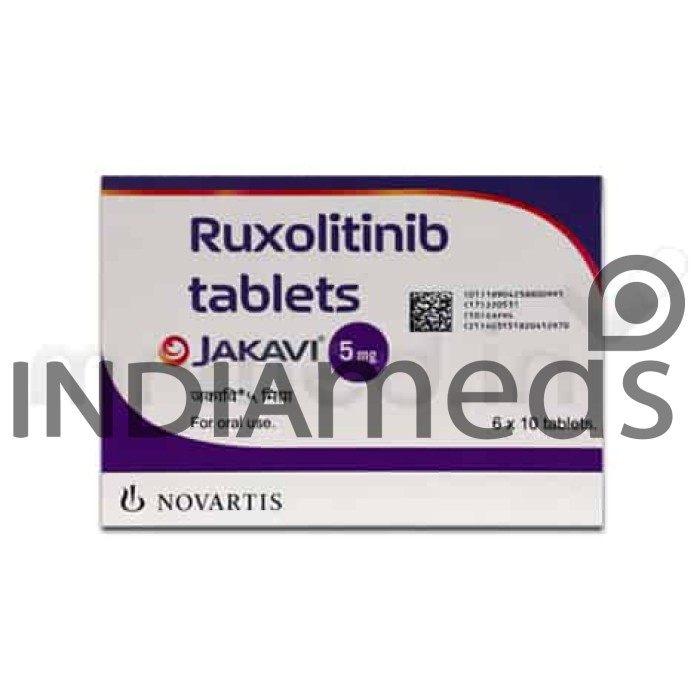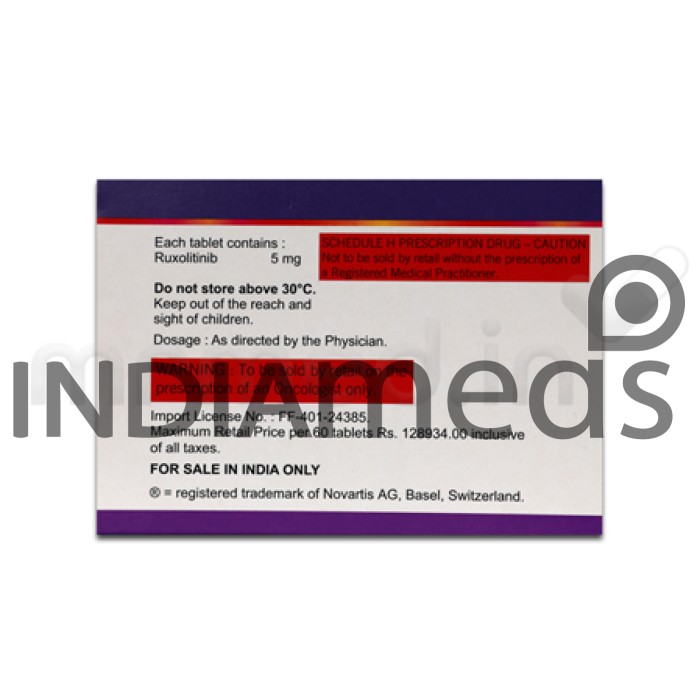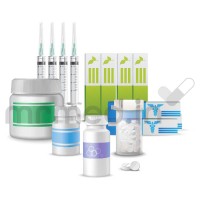Jakavi 5mg tablet contains the active constituent ruxolitinib. It is an anticancer agent that belongs to the class of kinase inhibitors. It is used to treat myelofibrosis ( a rare type of bone marrow cancer that causes decreased blood cell production). It is also used to treat polycythemia vera (a type of blood cancer where the body produces too many red blood cells) in people who are resistant or cannot be treated successfully with hydroxyurea. The medicine is also indicated to treat acute graft versus host disease (a complication of transplant procedure that replaced diseased bone marrow with healthy bone marrow) previously treated unsuccessfully with steroid medications in adults and children 12 years of age. It is also used for treating chronic graft versus host disease in adults and children 12 years of age and older who were treated unsuccessfully with 1 or 2 other systemic treatments.
Jakavi 5mg tablet works by blocking the signals that cause cancer cells to multiply. Do not take this medicine if you are allergic to ruxolitinib or any other ingredients in this medicine. Inform your physician priorly if you have or had tuberculosis, hepatitis B or C, liver disease, and kidney problems. The most common adverse effects are dizziness, reduced blood counts, bruising, bleeding, headache, and facial and body swelling. Notify your physician if you are on dialysis.
Therapeutic Effects of Jakavi 5mg Tablet
Pregnancy
Do not take Jakavi 5mg tablet if you are pregnant because this may harm the unborn baby. Inform your physician if you are pregnant, suspecting pregnancy, or planning to get pregnant during the treatment.
Breast Feeding
Breastfeeding is not recommended in patients taking Jakavi 5mg tablet because the medicine passes into the breast milk in small amounts and may harm your baby. Do not breastfeed during the treatment and for 2 weeks after the last dose.
Lungs
It is unknown whether Jakavi 5mg tablet can be used in patients with lung disorders. Consult your doctor if you have any lung diseases before starting the treatment.
Liver
Jakavi 5mg tablet should be administered cautiously in patients with liver problems. Dose adjustments are necessary for patients with liver diseases. Inform your physician if you have any liver disorder before the treatment.
Alcohol
It is unknown whether consuming alcohol is safe when taking Jakavi 5mg tablet. Inform your physician if you are an alcoholic before starting the treatment.
Driving
Do not drive or operate heavy machinery if you feel dizzy after taking Jakavi 5mg tablet. Consult your doctor for more advice.
Common
- Low red and white blood cell counts
- Low platelet counts
- Dizziness, headache
- Bruising
- Diarrhea
- Infections including viral infection
- Swelling in the face and body
- Fatigue or tiredness
Serious
- Severe infections like hepatitis B
- Anemia
- Bleeding
Jakavi 5mg tablet should be cautiously taken if you have any kidney problems. Dose adjustments are necessary for patients with kidney diseases. Inform your doctor if you are on dialysis and have any kidney disorders.
Inform your physician if you have active tuberculosis or a past medical history of tuberculosis before starting the treatment with Jakavi 5mg tablet.
Grapefruit or grapefruit juice should be avoided while taking Jakavi 5mg tablet. Unless your doctor suggests special diets, you can follow the normal diet.
The medicine can suppress your immune system and increase your chances of getting infections. Take precautions to prevent illness and injury.
If you overdosed or took two doses of Jakavi 5mg tablet unknowingly, immediately inform your healthcare professional and seek medical advice.
Molecule name: Ruxolitinib | Therapeutic class: Antineoplastics |
Pharmacological class: Kinase inhibitors | Indications: 1. Myelofibrosis 2. Polycythemia vera 3. Acute-graft-versus host disease 4. Chronic-graft-versus host disease |






